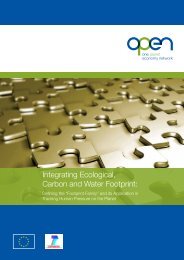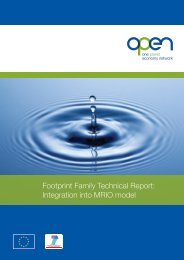OPEN: EU Scenario Storylines Report: - One Planet Economy Network
OPEN: EU Scenario Storylines Report: - One Planet Economy Network
OPEN: EU Scenario Storylines Report: - One Planet Economy Network
Create successful ePaper yourself
Turn your PDF publications into a flip-book with our unique Google optimized e-Paper software.
In this future, European society is strongly divided and work-obsessed. There is<br />
a large social gap between the very few who can still afford affluent lifestyles and the<br />
masses that have been forced to significantly reduce their overall levels of material<br />
consumption. The impact of increasing prices for materials, products and services means<br />
that people have not seen significant increases in real wages for the last four decades. To<br />
compensate, people work long hours and many are unable to take even short holidays.<br />
The average age of retirement has increased significantly.<br />
Many Europeans are employed in service industries, since manufacturing and<br />
primary industries are increasingly constrained by resource shortages. Aside<br />
from agriculture, sectors such as education, financial services, media, marketing,<br />
restaurants, hotels, and caring professions are major employers. A shift in taxation from<br />
labour to resources favours employment in the agriculture and services, although some<br />
manufacturing remains, especially for high-quality goods. A large pool of low skilled<br />
immigrant labour supports, but does not dominate, the agricultural sector. Women<br />
working at home or in occupations that were previously not counted as part of the official<br />
labour market are now included in the workforce due to the expansion of the boundaries<br />
of the economy to include traditionally non-GDP contributing care-giving professions.<br />
Education and knowledge services have become some of the most important sources of<br />
<strong>EU</strong> export earnings, being one of the few industries that can deliver GDP growth with<br />
minimal environmental degradation and result in a ―greening‖ of the economy. Those<br />
Europeans who can afford it, receive a high quality, but extremely tailored education,<br />
which is highly focused on vocational training to produce a superior skilled service<br />
workforce.<br />
Energy prices are high. Since 2025, the availability of fossil fuels has been strongly<br />
constrained by surging demand in the powerhouse economies of China, India, Brazil and<br />
other rapidly developing economies with large populations such as Indonesia and Nigeria.<br />
In Europe, like many countries around the world, alternative technologies were not<br />
deployed quickly enough to avoid energy shortages, resulting in numerous energy<br />
shocks. It is not until these supply-induced shocks impact on the quality of life of average<br />
people that meaningful demand-side policies are implemented. Energy and fossil fuels<br />
are taxed heavily – both via the highest carbon prices of all scenarios and aggressive ―at<br />
the pump‖ petrol taxes. These act as strong drivers to spread the use of the best<br />
technological solutions existing in 2011, but also push up prices which many consumers<br />
cannot afford to pay.<br />
Energy rationing becomes the norm. The rich, however, can afford to pay the upfront<br />
capital investments required to save energy (in their homes through efficiency<br />
renovations and by purchasing ―best practice‖ products, and vehicles that run on<br />
biofuels). Many of the poor cannot afford to pay the up-front costs of these goods and<br />
must use their energy ration sparingly. Due to high electricity prices, many poor opt to<br />
sell portions of their rations to the wealthy, as they cannot afford to pay to consume their<br />
entire ration. As a back stop to control consumption, smart metering technology is<br />
increasingly used to cut off customers from non-critical electricity use, along with civil<br />
and criminal penalties for exceeding rations.<br />
Electricity production is high along the coastlines of Northern Europe, where offshore<br />
wind energy has proliferated, but in other regions there are limited alternatives to<br />
replace fossil plant on a large scale (e.g. CCS never becomes viable). Solar energy is the<br />
main renewable energy source in Southern Europe, although it remains expensive.<br />
Page 31 of 57





